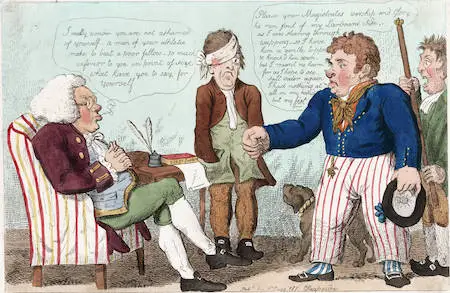Land-lubber isn’t, as some people think, a variant of land-lover, but derives from the much earlier word lubber. A lubber was the name for a big, clumsy lout or layabout. The word is now pretty much obsolete but in its day was a very common and has existed since at least the 14th century, when it appeared in print in William Langland’s poem Piers Plowman, 1362. Other lubbers were named, for instance, an abbey-lubber was an idle or debauched monk.
What sailors meant by a land-lubber wasn’t someone who stayed on land. The term was reserved for those inexperienced members of the crew who they thought should have stayed on land.
In the heyday of sail, in Georgian England, a menial job aboard a ship was a fall-back employment for any man who couldn’t find work on land. Life on a sailing ship was laborious and dangerous and the inexperienced landsmen who didn’t know the ropes were despised by seasoned seamen. To call someone a land-lubber wasn’t just a bit of good natured teasing, it was a serious insult.
The feeling that sailors had towards land-lubbers was made clear in Herman Melville’s novel, Omoo, 1847:
Now, nobody is so heartily despised as a pusillanimous, lazy, good-for-nothing land-lubber; a sailor has no bowels of compassion for him… whenever there is any plain, hard work to be done, he is put to it like a lever.
The first time that land-lubber appears in print is in the anonymous B.E.’s glossary A New Dictionary of the Terms Ancient and Modern of the Canting Crew, 1699:
Land-lopers or Land-lubbers, Fresh-water Seamen so called by the true Tarrs.
There’s no better source of information about the language of British sailors than Admiral William Smyth’s
The Sailor’s Word-Book: an alphabetical digest of nautical terms, 1867. As well as land-lubber, sailors had a long list of disparaging terms for landsmen who ended up on ships:
BRICKLAYER’S CLERK. A contemptuous expression for lubberly pretenders to having seen “better days,” but who were forced to betake themselves to sea-life.
CHUCKLE-HEAD. Clownishly stupid lubber.
CLOD-HOPPER. A clownish lubberly landsman.
COSIER. A lubber, a botcher, a tailoring fellow.
DAMBER. An old word for lubberly rogue.
GAW-GAW. A lubberly simpleton.
GREEN-HORN. A lubberly, uninitiated fellow. A novice of marked gullibility.
HORSE-MARINE. An awkward lubberly person. One out of place.
LOB-COCK. A lubber; an old term of utter contempt.
LORRELL. An old term for a lubberly fellow.
SCOW-BANKER. A manager of a scow [a flat-bottomed boat].

